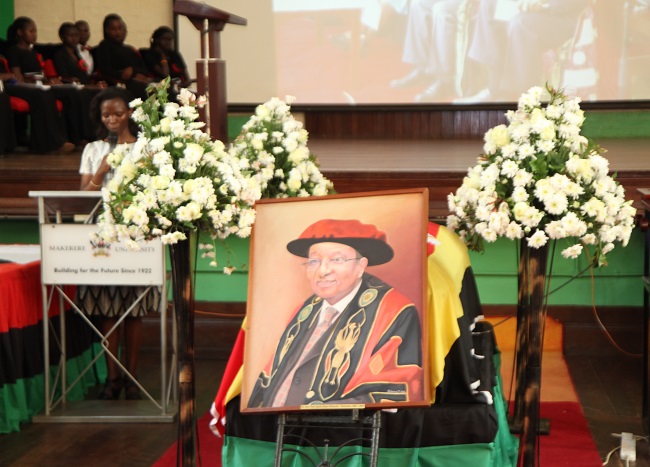Makerere University, Council, Management, staff, students and alumni gathered in the Main Hall to pay tribute to their former Chancellor and Prime Minister of Uganda, Rt. Prof. Apolo Robin Nsibambi. The fare thee well ceremony took place on 31st May 2019 and was also attended by the family and friends of the deceased, government officials and religious leaders.
Prof. Nsibambi joined Makerere University as a student where he attained his first degree (Bachelor of Science Degree in Economics) and he was a lecturer at Makerere University during the 1960s. He served as the Dean Faculty of Social Sciences for two terms; from 1978 until 1983 and from 1985 until 1987.
He also served as the Head of the Department of Political Science from 1987 to 1990 and as the Director Makerere Institute of Social Research (MISR) from 1994 to 1996. Prof. Nsibambi was appointed as the first non-Head of State Chancellor of Makerere University in 2003, a position he held up to 2007. He was appointed as the 8th Prime minister of Uganda from 1999 until 2011.
Makerere University commended the late Prof Apolo Robin Nsibambi for his selfless service and association with people from all walks of life regardless of his academic, social and political stature and for the love he had towards the University and the Nation at large.
Reflecting on the professional relationship shared with Prof. Nsibambi, Prof. Ezra Suruma, the Chancellor of Makerere University said: “Prof Nsibambi was my Dean when I worked as a Senior Lecturer, Faculty of Social Sciences at Makerere University. Additionally, he was the Prime Minister of Uganda during my term as the Minister Finance, Planning and Economic Development.”
Prof. Suruma noted that he will always honor Prof. Nsibambi as his academic colleague, Dean, leader in Parliament and predecessor as Chancellor. He referred to Prof. Nsibambi as a gentleman using Shakespeare’s quote when he said, “His life was gentle and the elements so well mixed in him that nature itself might stand up and say: That was a man.”
In his speech, the former Chancellor of Makerere University, Prof. Mondo Kagonyera praised Prof. Nsibambi for being a good time manager and said that he will always be remembered for his humor, integrity and kindness.
“Prof. Nsibambi was a man who would speak his mind and always say the truth, he was humble, disciplined and obedient to everyone and always based his discussions on the law,” said Prof. Kagonyera.
He applauded Prof. Nsibambi’s wife, Mrs. Esther Nsibambi for taking care of her husband during the time of sickness.
Mrs. Lorna Magara, the Chairperson Makerere University Council commended the late Prof. Nsibambi for his distinguished and dedicated service towards Makerere University which led to his appointment as the first non-Head-of-state Chancellor.
“He diligently served Makerere University from 1960s to 1996 as an academic member of staff and in various leadership positions. He will be remembered for his humility, punctuality and outstanding eloquent speeches,” said Mrs. Magara.
The Vice Chancellor, Makerere University, Prof. Barnabas Nawangwe, listed the characteristics of integrity that the late Prof. Nsibambi proposed to be emulated during his Keynote address delivered at the Bernard Onyango Inaugural Public Lecture and these include;
- Know that it is the little things which count (attention to detail)
- If you mess up, confess the mistake and correct it (accountability)
- Keep your word (trust)
- Care about the greater good, i.e. the good of the institution and not the good of the individual
- Be honest and modest
- Act like you are always being watched by others
- Bring close to you those of similar virtues and talents
- Do not be detracted provided you know you are on the right path
Emphasizing on the first reading from the book of Ecclesiastes 3:1-8, Rev Asiimwe Onesimus, the Chaplain St. Francis Chapel Makerere University, called upon everyone to be prepared for their last days. The two sermons were read from Ecclesiastes 3:1-8 and 2nd Timothy 4:6-8 by Dr. Susan N. Kiguli and Dr. Suzie Nansozi Muwanga respectively.
This was accompanied by beautiful hymns by the Choir from the Department of Performing Arts and Film Makerere University.
Speaking on behalf of the family, the late Prof. Nsibambi’s children, Mrs. Juliet Nanteza Kasujja and Mrs. Lydia Nabaggala Mulondo referred to their father as a friendly, caring and loving father who always stood by the truth.
“He was a generous person who always shared whatever he had with others. He was an honest man and a good time manager,” said Mrs. Nabaggala Mulondo.
To her fallen father, Mrs. Nanteza Kasujja said: “You are a great man, you loved God and we know you went to him. May your soul Rest in Peace.”
Rt. Prof. Apolo Robin Nsibambi was born on 25th October 1940 and passed away on Tuesday 28th May 2019.
Article by Nakibombo Esther Joyce, Volunteer , Mak Public Relations

 General1 week ago
General1 week ago
 General1 week ago
General1 week ago
 General1 week ago
General1 week ago
 Health3 days ago
Health3 days ago
 General2 weeks ago
General2 weeks ago



